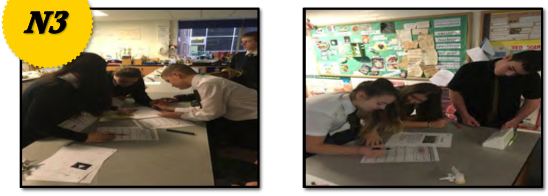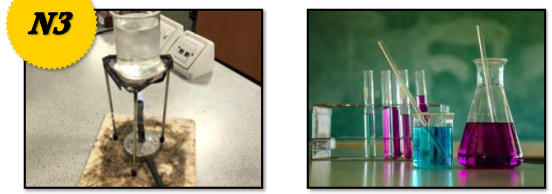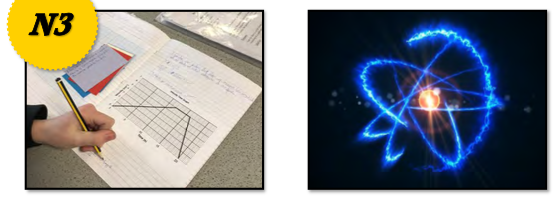Biology
What will I learn?
The National 3 Biology Course develops the concepts of biodiversity, interdependence, body systems and cells and inheritance. Learners recognise the impact biology makes on their lives, on the lives of others, on the environment and on society.
It comprises of three units:
Cell Biology
The key areas covered are cells; DNA; DNA profiling, photosynthesis; microorganisms; controlling microorganism growth.
Multicellular Organisms
The key areas covered are organs and organ systems; monitoring health and improving quality of life; body defences and role of vaccines; fertilisation, embryonic development and risks to embryo.
Life on Earth
The key areas covered are habitats and biodiversity; different types of chemicals in agriculture.
How will I learn?
Learners will develop and apply their knowledge of Biology by working collaboratively to carry out experiments, research tasks and presentations. This will enable them to develop their scientific inquiry, investigative and analytical thinking skills in a biological context. They will also have opportunities to discuss and debate the moral and ethical implications of current biological issues.
There will be opportunities for the development of literacy and numeracy skills and where appropriate, aspects of health and wellbeing and ICT will be included.
How will I be assessed?
Learners will be required to pass the SQA Unit Assessments for each of the three units. They will also be required to carry out a practical investigation as part of their assessment.
There is no external exam at National 3 level.
Career Opportunities
There are many and varied career opportunities for students of Biology including research, teaching, medicine, dentistry, nursing, midwifery, physiotherapy, occupational health, pharmacy, sport sciences, food industry, veterinary medicine, zoology/animal care, forensics, hairdressing, farming, renewable energy, etc. The skills developed in Science subjects can also lead to careers in many other areas.

Chemistry
What will I learn?
The National 3 Chemistry Course enables learners to develop a basic knowledge and understanding of chemistry. Learners also develop an understanding of chemistry’s role in scientific issues and relevant applications of chemistry in society and the environment.
It comprises of three units:
Chemical Changes and Structure
In this unit the topics covered are chemical structure; rates of reaction; acids and bases.
Nature’s Chemistry
In this unit the topics covered are fuels and energy; plants for food and oils; plants for medicines.
Chemistry in Society
In this unit the topics covered are metals, corrosion and batteries; plastics, ceramics and novel materials; properties of solutions; chemical analysis and the chemical industry.
How will I learn?
Learners will develop and apply their knowledge of Chemistry by working collaboratively to carry out experiments, research tasks and presentations. This will enable them to develop their scientific inquiry, investigative and analytical thinking skills in a chemical context. They will also have opportunities to discuss and debate the moral and ethical implications of current chemical issues.
There will be opportunities for the development of literacy and numeracy skills and where appropriate, aspects of health and wellbeing and ICT will be included.
How will I be assessed?
Learners will be required to pass the SQA Unit Assessments for each of the three units. They will also be required to carry out a practical investigation as part of their assessment.
There is no external exam at National 3 level.
Career Opportunities
There are many and varied career opportunities for students of Chemistry including research, teaching, medicine, dentistry, pharmacy, engineering, food industry, veterinary medicine, forensics, oil/gas/ nuclear industries, pharmaceutical industry, environmental monitoring, alternative energy, hairdressing, farming, technology, etc. The skills developed in Science subjects can also lead to careers in many other areas.

Physics
What will I learn?
The National 3 Physics course allows learners to acquire basic knowledge of concepts in physics and be able to apply their understanding to practical situations.
It comprises of three units:
Electricity and Energy
The key areas covered are electricity; energy transfer.
Waves and radiation
The key areas covered are colour; optical instruments; sound.
Dynamics and Space
The key areas covered are
energy sources; wave properties; light; electromagnetic radiation; forces; the solar system.
How will I learn?
Learners will develop and apply their knowledge of Physics by working collaboratively to carry out experiments, research tasks and presentations. This will enable them to develop their scientific inquiry, investigative and analytical thinking skills in a physical context.
There will be opportunities for the development of literacy and numeracy skills and where appropriate, aspects of health and wellbeing and ICT will be included.
How will I be assessed?
Learners will be required to pass the SQA Unit Assessments for each of the three units. They will also be required to carry out a practical investigation as part of their assessment.
There is no external exam at National 3 level.
Career Opportunities
There are many and varied career opportunities for students of Physics including research, teaching, medicine – diagnosis and treatment, renewable energy, electrical/mechanical/civil engineering, electronics, oil/gas/nuclear industries, construction, transport, telecommunications. The skills developed in Science subjects can also lead to careers in many other areas.


